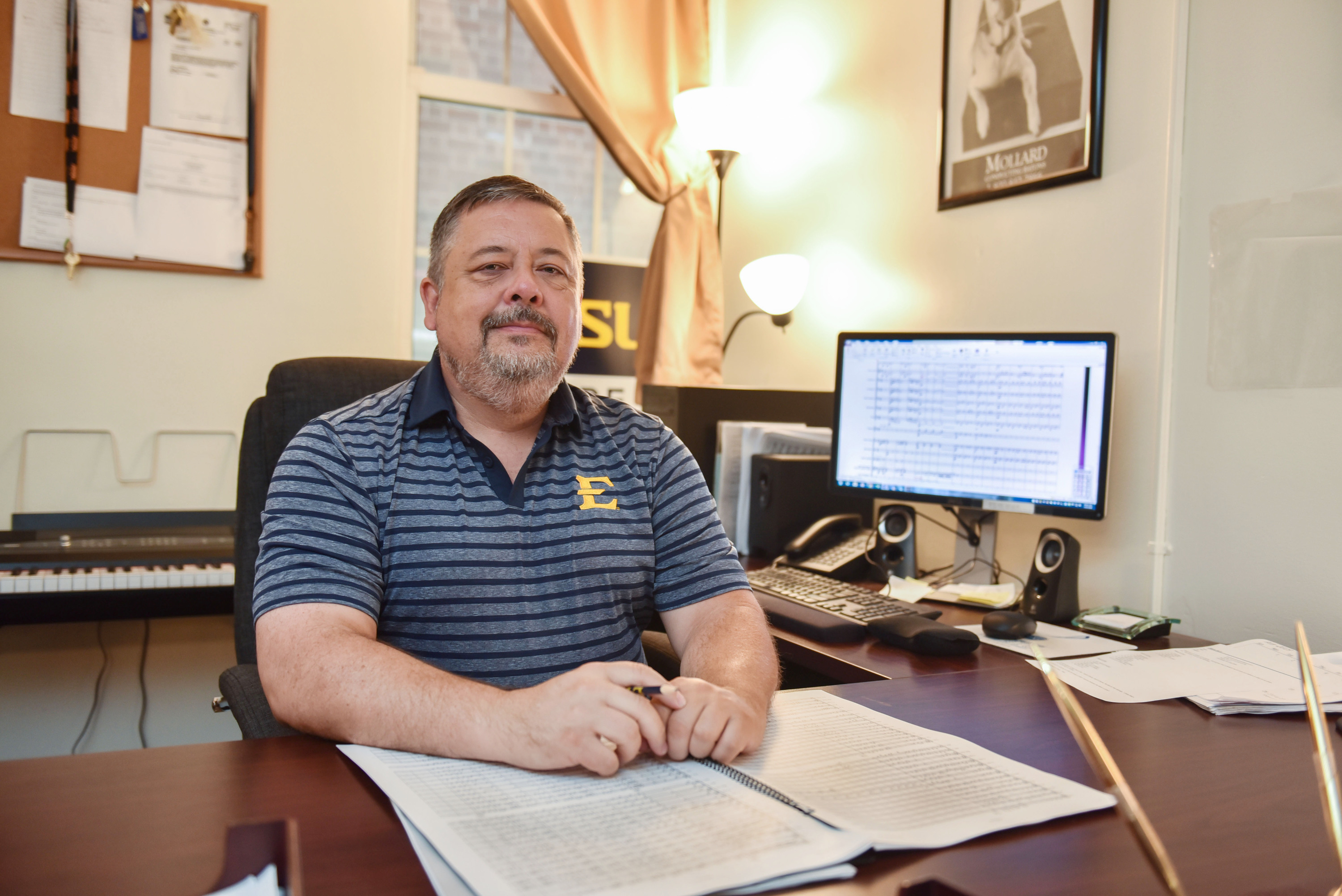

Dr. Joe Moore
JOHNSON CITY – When the Johnson City Community Concert Band hit the stage at Winged Deer Park’s Lakefront Festival Plaza Goulding Amphitheatre Saturday, July 27, one of the numbers it performed was a special piece composed by East Tennessee State University’s Dr. Joe Moore to commemorate the Johnson City Sesquicentennial.
Moore, associate director of bands and director of athletic bands at ETSU, was selected as the composer for the piece by the Community Concert Band’s board of directors upon the recommendation of a board member who is an avid follower of the Marching Bucs. Moore was approached about the idea by his colleague Dr. Christian Zembower, ETSU director of bands and conductor of the JCCCB.
“At that point, I’d only arranged music – taken existing music and arranged it for marching band – but I’d never composed anything from scratch,” Moore said. “Since then, I have published a march based on an Irish folk tune. But we discussed what it needed to look like – something that would signify the Sesquicentennial and be relevant to it – and they pretty much gave me free rein.”
Moore began looking for music from 1869, the year of Johnson City’s founding, but because that time was well before the invention of the radio and the phonograph, the only way people would have heard music was through live music. They would have been familiar with the folk music passed down through families and communities, and also the music performed by town bands, which were often former Civil War regimental bands. However, they might not have been familiar with many songs actually written in 1869, because it would have taken some time for those tunes to make their way to the local area.
“I decided to do a three-movement suite, with each movement having its own characteristic and its own mood, and called it ‘Echoes of 1869,’” Moore said.
The first movement, “Quickstep,” incorporates marches from the Civil War era, which include popular tunes of the day, such as “Annie of the Vale” and “Twinkling Stars are Laughing, Love.” The music of many pieces from that time is preserved in such places as the Library of Congress and the Old Salem Museums & Gardens in Winston-Salem, North Carolina, home of the vaunted 26thNorth Carolina Regimental Band, which was largely comprised of musicians from the Moravian Church.
“A lot of their music was obviously patriotic,” said Moore, who performed with a Civil War reenactment band when he lived in Georgia. “But one thing that is kind of unique is that they took popular songs of the day and made them into marches, so that the soldiers could take comfort in hearing the music they knew and enjoyed while doing their daily drills and marching from one location to the other. They’re called quickstep marches.
“These Civil War bands were very small brass bands, and I’m writing for a concert band, which is large and uses all kinds of instruments, so I really tried to work to maintain the feel, the lightness of that small group in a large group setting.”
Moore said another way people were exposed to music was through church, and so the second movement of “Echoes of 1869” is called “Hymn.” For this, he incorporated “Near the Cross,” which was written in 1869, and combined it with “When I Survey the Wondrous Cross,” an earlier hymn that would have been sung in churches and camp meetings at that time.
The third movement, “Popular Songs,” is a medley of tunes that were either written in 1869 or were popular during that era. These include songs still widely known today, such as “Shoo Fly, Don’t Bother Me,” “Little Brown Jug” and “Listen to the Mockingbird,” which was not only written in 1869 but pays homage to what would later be designated as the official state bird of Tennessee.
“What I like about Dr. Moore’s piece is the research he put into it, being mindful of the style of music in 1869 and the tunes of the day,” said Carol Jensen, an executive aide in the ETSU Department of Psychology who plays clarinet in the JCCCB. “All three movements are delightful to play, but I am especially drawn to the second movement, based on the hymn ‘Near the Cross.’ The harmonies, dynamics and instrumental combinations are lush and provoke deep emotion for the performer and the listener alike. The first and third movements are downright fun to play, and I think the audience will find this piece very enjoyable and relatable.
“This composition, in my opinion, is an excellent way to honor the 150thanniversary of Johnson City and its heritage,” Jensen continued. “Dr. Moore has poured a lot of time and love into this piece, and it shows.”
In addition to the July 27 performance of “Echoes of 1869” by the JCCCB, for which Moore was guest conductor, the piece will be performed a second time as part of the year-long Sesquicentennial Celebration in a free public concert by the ETSU Wind Ensemble, which will be held Oct. 17 at Seeger Chapel on the campus of Milligan College.
As part of the commissioning agreement for the piece, the music for “Echoes of 1869” is property of the City of Johnson City. It will be kept in the city archives and made available to any school in Johnson City and Washington County to use.
After the city’s Sesquicentennial is over at the end of 2019, Moore plans to publish “Echoes of 1869” and make it available, in whole or in part, for bands worldwide to use.